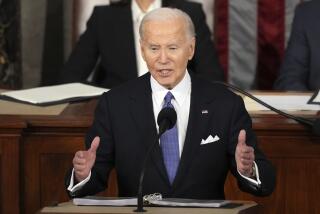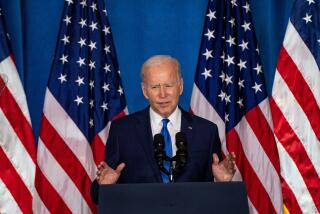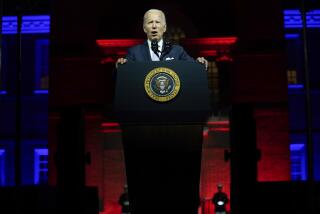Bush again warns of risk of U.S. failure in Iraq
- Share via
RENO — President Bush warned Tuesday that the Middle East faces a bleak future if the United States fails in Iraq, evoking a “dark vision” of terrorist havens, disrupted energy supplies and a regional arms race triggered by a nuclear-armed Iran.
“The region would be dramatically transformed,” Bush said in a speech to the American Legion’s national convention, “in a way that could imperil the civilized world.”
In particularly muscular language, Bush cited recent evidence of Iranian weapons in Iraq and renewed his demand that the Iranian leadership halt support for attacks on U.S. troops.
“Until it does, I will take the actions necessary to protect troops,” he said. “I have authorized our military commanders in Iraq to confront Tehran’s murderous activities.”
The speech was the second Bush has delivered in a week seeking to lay out his strongest arguments for pursuing the course he has set in Iraq before September, when Congress will return to renew debate on the war and funding for military operations.
Deputy White House Press Secretary Scott Stanzel said Tuesday that Bush was not enunciating a new policy toward Iran nor foreshadowing a military operation in Iran, which borders Iraq. He cautioned reporters not to “read too much into” his remarks. However, the president did step up his rhetoric in the speech, renewing his emphasis on the threat that Iran could become a nuclear power and referring to Iran 22 times in the 45-minute speech.
The president noted that U.S.-led forces had seized 240-millimeter rockets manufactured in Iran that were “provided to Iraqi extremist groups by Iranian agents” and said that attacks with Iranian-supplied munitions had increased recently.
“The Iranian regime must halt these actions,” Bush said.
In describing the chaos that he said could engulf the Middle East if U.S. troops were withdrawn from Iraq, Bush used some of his starkest language yet.
“Extremists would control a key part of the world’s energy supply, could blackmail and sabotage the global economy,” he said. “They could use billions of dollars of oil revenues to buy weapons and pursue their deadly ambitions.”
Bush repeated his argument that the increase in U.S. troops, from roughly 130,000 to 160,000, had been completed barely two months ago and should be given time to work. He said the buildup had already led to increased security and successes in displacing insurgents in provinces where terrorist groups were once dominant.
Noting the limited success at achieving political reconciliation among Shia and Sunni Muslims, Kurds, and other sectarian and ethnic groups, Bush said that in the midst of security challenges, Iraqi leaders were “being asked to resolve political issues as complex and emotional as the struggle for civil rights in our own country.”
The Bush administration is under congressional mandate to deliver a report on the war’s progress to Congress by Sept. 15, and Army Gen. David H. Petraeus, the top U.S. commander in Iraq, and Ryan Crocker, the U.S. ambassador to Baghdad, are scheduled to testify before Congress on Sept. 11 and 12.
Senate Majority Leader Harry Reid (D-Nev.) said Tuesday that Bush “missed the mark yet again.” Reid said the country agreed on the need to help Iraq, but Bush was pursuing “a flawed strategy” that put troops in a civil war, while it “failed to deliver the political solution necessary for Iraq’s stability that he promised.”
Rep. John A. Boehner of Ohio, the House GOP leader, cited the recent military successes in Iraq and said: “A growing number of my Democratic colleagues have witnessed our troops’ successes firsthand and are realizing the folly of their leadership’s yearlong political calculation to simply declare: ‘The war is lost.’ ”
Bush used U.S. legislative history Tuesday to counter the criticism of the Iraq’s failure to pass key legislation, including a law that would distribute oil revenue, saying “even we can’t pass a budget on time -- and we have had 200 years of practice.”
In Bush’s view, two currents of Islamic extremism are vying in Iraq for domination of the Middle East. Sunni extremism, embodied by Al Qaeda and its affiliates, and Shiite extremism, fueled by Iran, which also supports Hezbollah, Hamas and the Taliban. “For the sake of our own security,” Bush said, “we’ll pursue our enemies, we’ll persevere and we will prevail.”
--
More to Read
Get the L.A. Times Politics newsletter
Deeply reported insights into legislation, politics and policy from Sacramento, Washington and beyond. In your inbox twice per week.
You may occasionally receive promotional content from the Los Angeles Times.










